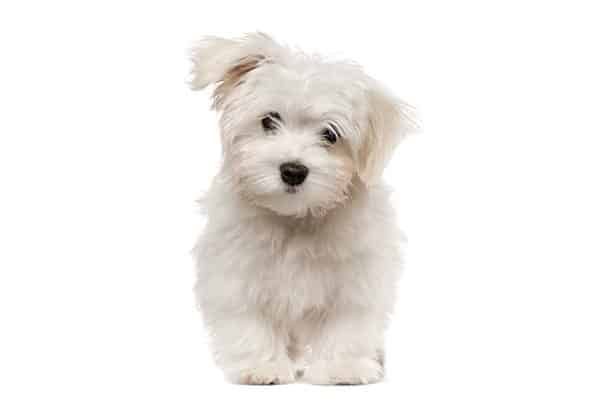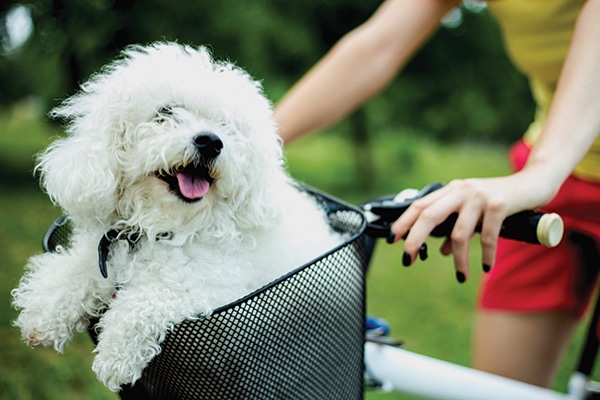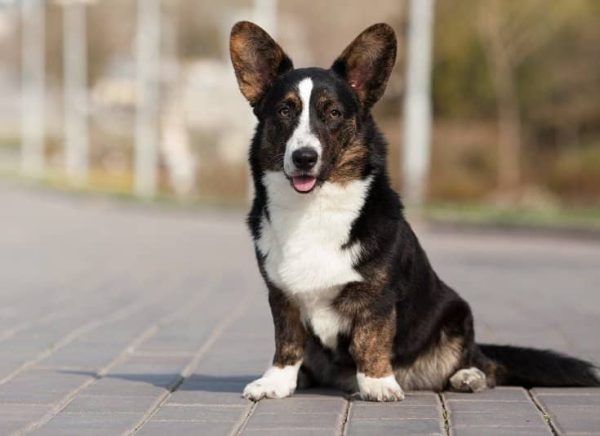A petite yet sturdy breed, the Bichon Frisé is renowned for his cheerful disposition. Plus, his signature white-powdered coat and gentleness woo admirers all around the world.

Bichon Frisé History
The Bichon’s worldwide fan base is steeped in history. Wide-reaching travel was integral to the Bichon’s development. Developed in the Mediterranean from a mixture of Poodles and Water Spaniels, the Bichon Frisé was particularly popular in Spain and France.
Sea merchants traded the merry dogs in various ports. Sailors bestowed the little dogs as gifts to their special ladies in varied harbors, leading to the nickname “Love Dog.” King Henry III carried his indulged Bichon around his neck in a decorated basket. The French verb “bichonner” translates loosely to (no surprise!): doll up, groom or pamper. The celebrated Bichon was depicted in art, frequently painted together with his stylish owners.
But despite his fashionable early years, the Bichon demonstrated his breed’s hardiness in more recent centuries. In the 19th century, the Bichon took on less glamorous roles, living with the lower classes and performing in circuses and fairs. The breed’s adaptability allowed him to flourish in both the world of luxury and the world of work.
The Bichon Frisé Today
Today, the easygoing Bichon is adaptable to varied lifestyles. He’s eager for activity yet willing to cuddle on laps. Moreover, he still demonstrates the merry little nature that shipmen (and their ladies in every port!) and royalty cherished.
The Bichon’s dark-eyed, inquisitive countenance, as well as his joyful approach to life, continues to steal hearts today. Capable of excelling in sports such as agility and rally, the Bichon’s calm manner and affectionate nature also serve him well in therapy settings. The Bichon’s sweet makeup generally extends to other animals as well. Most (socialized) Bichons enjoy the family’s other dogs and often the cats, too.
Smart but at times spirited and independent, the Bichon responds to positive training with enthusiasm, at least most of the time. While he thrives on walks or learning tricks, the Bichon doesn’t expect a full day’s trekking to wear him out. Most Bichon match up with apartment dwellers nicely. Just be prepared for the occasional burst of energy, often demonstrated in jubilant, scatty scampering around the house. Too social and charming for guard duty, the Bichon nonetheless offers plenty of warning barks when dogs, mail carriers or the every-threatening squirrel strolls by the house.

Bichon Frisé Facts:
- Tail’s tale: The Bichon carries his plumed tail jauntily over his back
- Classic coat: The undercoat is soft and dense, while the outercoat is coarser and curlier. When groomed, the Bichon presents an overall powder puff appearance.
- Color: Cottony white.
- Trimming? Yes! The Bichon’s non-shedding hair grows continually.
- Grooming: Along with trims, regular grooming helps prevent mats and keeps the wavy coat healthy. A puppy starts out with an easy-care topcoat but develops a cottony, fine undercoat requiring regular brushing.
- Time to brush? Make brushing a bonding experience, since you’ll need to spend about 20 minutes brushing your Bichon, two to three times per week
- Breed saying: “A merry heart makes a cheerful countenance.”— King Solomon
- Life span: 10 to 13 years
- Weight: About 11 to 16 pounds
Thumbnail: Photography by MARIJARADOVIC/ISTOCK.
Read more about dog breeds on Dogster.com:
- The 5 Smartest Dog Breeds Brag About How Intelligent They Are
- The 5 Most Loyal Dog Breeds
- Think You Know Dog Drool? Meet These 5 Deliciously Drooly Breeds
Originally an attorney, Lynn Hayner has been writing for companion animal publications for more than 15 years. She researches breed profiles, dabbles in animal law issues and collects stories about dogs and their families in her travels. A lifelong dog aficionado, Lynn is shadowed by her “Who the heck needs a leash, I’ll follow mama any- where,” German Shepherd Dog, Zoey. Follow Lynn on Twitter at @lynnhayner.






